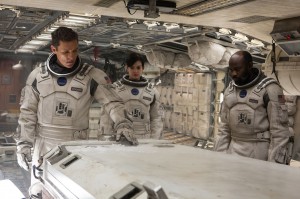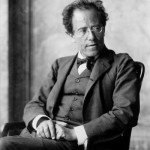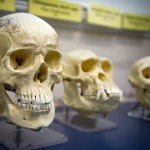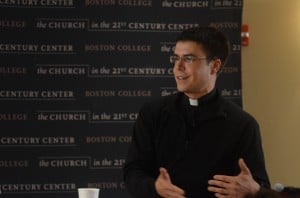Memory, like sleep, hath powers which dreams obey,
Dreams, vivid dreams, that are not fugitive:
How little that she cherishes is lost!
–Wordsworth
This article contains plot spoilers.
What does the “science” in “science fiction” signify? I would propose that it is not astronomy or physics or biology, but anthropology: good science fiction explores the science of what it is to be human. I am reminded of this by two recent films that explore how our culture and memory shape our humanity.
In Christopher Nolan’s most recent film, Interstellar, Earth’s population is threatened by an uncooperative climate that engenders chronic crop failures, and a secret group of NASA scientists is trying to figure out how to save the human race from starvation. The film’s protagonist, Cooper, is asked to lead a team to find humanity a new home on a distant planet. If all goes well, they will be followed by giant spacecraft capable of bringing a significant number of people from Earth. The only catch is that the technology to launch such an enormous ship is beyond the scientists’ grasp. Prof. Brand, the mastermind behind the scheme, stays behind on Earth to try and figure this out, and is eventually joined in his research by Cooper’s daughter Murph.
In the event of the failure of this plan for a mass human exodus, there is a “Plan B”: part of Cooper’s cargo is a collection of frozen human embryos that could be used to begin a colony from scratch. It doesn’t sound like an appealing option, so when Cooper is trying to decide whether or not to accept his exploratory mission, Prof. Brand tells him, “You might have to decide between seeing your children again and the future of the human race.” In another scene he argues, “We must reach far beyond our own lifespans. We must think not as individuals but as a species.”
What does it mean, though, to “think as a species”? It turns out that Prof. Brand’s words have a subtext. As director of the NASA programme, he already knows that Plan A is hopeless, but secretly maintains its façade because he is afraid the truth would crush his colleagues. Nevertheless, he believes that “thinking as a species” means that the future of man can be preserved by seeding a planet with embryos that have no real connection to human history or culture back on Earth. Cooper, on the other hand, never sees this as a viable solution. For him, saving humanity means rescuing the people that are alive now, especially his children.
Cooper’s misgivings about Plan B indicate that to be human is not simply to be an isolated organism. Saving humanity means saving not only human beings qua individuals, but human beings in relationship with one another as members of a culture with a shared memory. When Cooper is accused by one of his fellow-voyagers of caring only about his family, his response is revealing. “I’m thinking about my family,” he acknowledges, but adds, “and millions of other families.” He is definitely onto something, for even the jaded Prof. Brand admits, “Love is the one thing that transcends time and space.” Saving human race cannot occur except in the context of saving families, since the family is the basis for culture and society. Humanity is not reducible to the DNA sequence of frozen embryos.
Similar themes of human nature were explored in The Giver. Though in many respects it was an inadequate adaptation of Lois Lowry’s novel (which I shan’t discuss here!), it did capture some key points competently. In the world of the film (and book), humanity has survived an unspecified apocalypse but has since settled into a peaceful way of life. However, the comfort of the human community is only ensured by removing the painful and violent memories of the past from its citizens, though at the expense of depriving them of good memories as well. The only people who have access to the past are the “Receiver of Memory” and his apprentice, Jonas, who use the memories to help their community leaders make wise decisions.
The main thesis of the novel, which is preserved fairly intact in the film, is that people without memory are not fully human. Without memories, the citizens of a seemingly perfect society become numb to their own emotions and deprived of any meaningful relationships. Worse, they have adopted a sanitised and efficient culture of murder to control their population, avoid old age and punish criminals; their lack of memory, however, means that they do not have fully developed consciences to know any better. They easily engage in duplicity if it is required to make the system work. Jonas, when he begins experiencing the history of humanity, starts realising that life without memory is not really human life at all. Just as Interstellar’s Cooper is convinced that man without a family—both in the nuclear sense and in the universal sense—is not truly human, so Jonas learns that a person without memory cannot have a family and cannot love.
Both of these films challenge not only the notion of man as simply a biological entity, but even the notion of him as simply a rational animal, to use Aristotle’s famous definition. Both the carefully organised way of life in The Giver and the amazing technological feats achieved in Interstellar show that humans are rational par excellence. However, the films reach beyond this to one of Aristotle’s other famous classifications: that man is a political animal. By “political”, Aristotle does not mean simply that man is social. After all, many other animals are social, be they bees or wolves or crows. Nor does he simply mean that man enjoys running in elections or making laws. He means that man’s rationality is only fully realised in a common life with other human beings. Only in dialogue, conversation, debate, cooperation, and perhaps even strife, can people fully realise their potential as intelligent creatures, which for Aristotle is marked above all by a culture embodying the virtue of justice.
To Aristotle’s vision of the political life, of course, the Christian gospel has much to add, particularly with regards to the greatest virtue of all, which is charity. But the basic point remains: we can only really be human if we intentionally live in relationships with authentic culture, kindle a desire for political virtue and a care for our common memory. Thankfully, the germ of this vision still exists in our culture, if the current state of science fiction in our cinemas is any indication.












